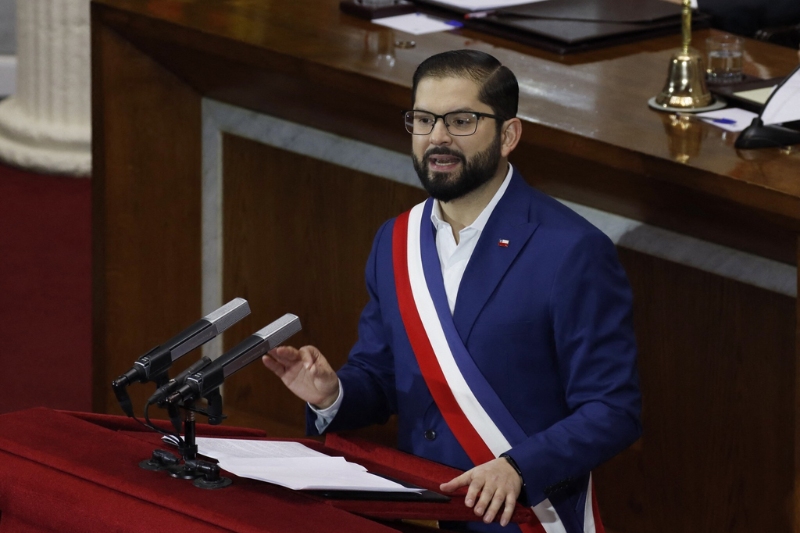Significantly geopolitally, Chilean President Gabriel Boric has said that his nation will back South Africa’s legal lawsuit against Israel before the International Court of Justice (ICJ) in The Hague. Presented under the UN Genocide Convention, the complaint charges Israel with genocide in Gaza via military actions.
The Declaration Made by President Boric
“Chile will join and back South Africa‘s case against Israel at the International Court of Justice in The Hague, under the UN Genocide Convention,” President Boric said in a thorough speech lasting more than two-and- a-half hours before the National Congress in Valparaiso. He underlined further, “I have ordered the Ministry of Foreign Affairs teams to prepare a brief with our arguments on this subject.”
This choice coincides with growing worldwide criticism of Israel’s conduct in Gaza, especially with relation to its attack on Rafah. With almost a million Palestinians fleeing Rafah and living in temporary settlements, the situation there has been grave.
Global Situation and Reactions
After three European nations this week acknowledge a Palestinian state and the head prosecutor of another international court requests arrest warrants for Israeli leaders and Hamas executives, Chile’s endorsement adds to the growing pressure on Israel.
Declaring the genocide accusations “false, outrageous and morally repugnant,” Israeli Prime Minister Benjamin Netanyahu’s government vehemently refutes them and insists that their military activities do not aim at people.
The Offense of Rafah
The battle has revolved mostly on Rafah, a southernmost city in the Gaza Strip that borders Egypt. Claiming to be the last significant stronghold for Hamas, Israeli military operations have escalated in this region. Humanitarian relief to Rafah has drastically decreased even with evacuation orders and a notable population exodus.
The ICJ’s decision mandates Israel to stop its onslaught in Rafah, guarantee access for war crimes investigators, and greatly boost humanitarian relief to Gaza. Though legally enforceable, this decision lacks an enforcement mechanism, as in other situations including Russia’s non-compliance with an ICJ judgment about Ukraine.
Keep Reading
Reactions of Human Rights Organizations
Human rights groups have voiced doubts as well as relief. Experienced human rights attorney Reed Brody pointed out how explicit and urgent the court’s ruling is, therefore depriving Israel of choices. On the other hand, Human Rights Watch’s Balkees Jarrah cautioned that the decision might be disregarded unless the world community shows Israel significant pressure.
Key member of Netanyahu’s war cabinet Benny Gantz, an Israeli official, said that Israel would keep running operations in Rafah while underlining the need of national security and the release of hostages taken by Hamas. Emphasizing Israel’s dedication to international law and humanitarian norms, he underlined that these ideals direct their behavior instead of the ICJ’s decision.
The position of South Africa
Longstanding ally of the Palestinian cause, South Africa has been outspoken in its charges of genocide against Israel. The ICJ’s decision was greeted by South African Foreign Minister Naledi Pandor, who also urged quick worldwide intervention to save Palestinians.
The Path Ahead
Although the ICJ’s ruling emphasizes the dire humanitarian situation in Gaza, it falls short of calling for a total ceasefire. The court’s decision orders Israel to let UN fact-finding trips looking at claims of genocide and to better Gaza’s humanitarian situation.
The case, which might take years to completely settle, has already seen the court mandate major interim actions. Earlier decisions have underlined Palestinians’ acute danger and the need of quick humanitarian help.
ICC Documents
Concurrent with the ICJ case, the International Criminal Court (ICC) charges war crimes and crimes against humanity against leaders of Israeli and Hamas. ICC Chief Prosecutor Karim Khan has asked for arrest warrants for well-known personalities including key Hamas leaders and Israeli Prime Minister Netanyahu.
Chile’s choice to back South Africa’s case against Israel before the ICJ indicates a significant change in the global reaction to the Gaza conflict. The immediate attention is still on solving the humanitarian crisis and guaranteeing responsibility for claimed war crimes and acts of genocide, even while the diplomatic and legal consequences are still developing.

